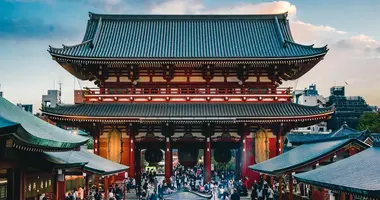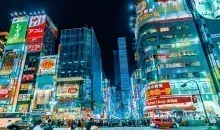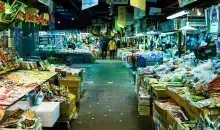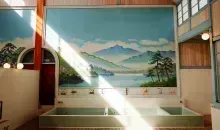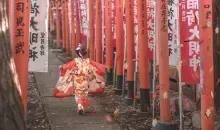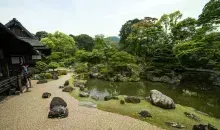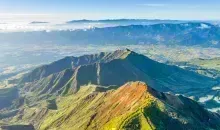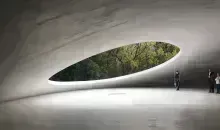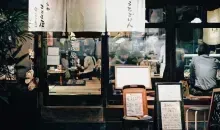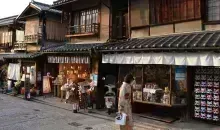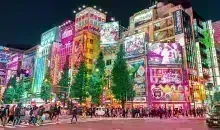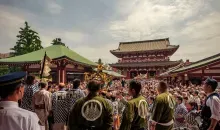Yasukuni Shrine 靖国神社
At the heart of an arrangement of memorial buildings for soldiers who died whilst fighting for the Emperor. The shrine seems so peaceful yet Yasukuni Jinja became very controversial.
Yasukuni Jinja
Yasukuni Shrine is adjacent to Kitanomaru Park, north west of the Imperial Palace, in the center of Tokyo.
Yasukuni Shrine History
Yasukuni Shrine was founded in 1869 to honor the men who fell in the Boshin War that restored the Meiji Emperor to power in 1868-9.
Since then Yasukuni has expanded to include the war dead of all Japan's subsequent conflicts and now the names, or the Shrine would say "souls," of over 2.5 million fallen are enshrined here.
Yasukuni Shrine became controversial when Japan's wartime leader General Hideki Tojo and 13 other Class-A war criminals (found guilty by the victorious allied forces after World War II at The International Military Tribunal for the Far East (IMTFE) or Tokyo War Crimes Tribunal) were enshrined here under secretive circumstances in 1979.
Subsequent visits by Japanese prime ministers and other politicians continue to enrage Japan's Asian neighbors China and South Korea and Yasukuni has become something of a mecca for Japan's right groups.
However, the Showa Emperor did not visit Yasukuni Shrine after the enshrinement of the Class-A war criminals and his son has not done so either, continuing his father's boycott.
Yasukuni Shrine Layout
Entrance to Yasukuni Shrine is through the massive gray, metal Daicihi Torii (First Shrine Gate), said to be one of the tallest torii in the country at 22m (72 feet) and a stately avenue of cherry and ginkgo trees.
A little on from the Daiichi Torii is Japan's first ever Western-style bronze statue, that of Omura Masujiro, the first Minister of War after the Meiji Restoration, which was erected in 1896. Also of note are two huge stone lanterns - Japan's largest - built in 1935 and which honor the Army and Navy respectively.
Further on is the Daini Torii (Second Shrine Gate), which is a smaller arch than the first, and right beyond it the Shinmon gate (pagoda-style rather than an arch) which leads into the shrine area.
Another arch, the Chumon Torii (Third Shrine Gate) leads into the courtyard of the Haiden Main Hall. This is where people pay their respects. No photography is allowed of the Haiden. Beyond that is the Honden Main Shrine, but it is usually inaccessible.
Right of the Chumon Torii is the biggest building on the grounds, the Sanshuden reception hall for formal occasions. Across from the Sanshuden is the Nohgakudo, or open air Noh Stage. And further to the right, is the Yushukan. The Yushukan's old original structure has had a modern annex built onto it, housing the Yushukan War Memorial Museum.
Outside the Yushukan War Memorial Museum are various statues paying tribute to every horse, every dog and other creatures that served in Japan's military in its various wars. Other monuments pay tribute to Chief Justice Pal from India, who found all the defendants of the Tokyo War Trials not guilty, and to the wives and children of service personnel who served in the IJA overseas.
Yushukan War Memorial Museum
The Yushukan War Memorial Museum, on the grounds of Yasukuni Shrine, is a modern military museum dedicated to Japan's armed forces since the start of the Meiji Period, when a national military, based on the western model, began to fight in wars on the Asian continent.
The version of Japanese military history presented at the Yushukan and in its video theater may not match that of nationals from other nations. The Japanese military in Asia in World War II are depicted as liberators of the continent from Western imperialism and welcomed by the native inhabitants.
This lack of tact has often revived tensions between Japan and the countries victims of its crimes, including China and South Korea.
Yasukuni Shrine Events
There is a weekly Sunday flea market on the grounds of Yasukuni Shrine, except during the blossom viewing season in April.
Yasukuni plays host to an annual exhibition sumo tournament at its spring festival April 21-30 and there is an autumn festival October 17-19. The Mitama Festival honoring the souls enshrined at Yasukuni takes place in July.
Address, timetable & access
Yasukuni Shrine
Address
3-1-1 Kudankita, Chiyoda-ku
102-8246
Japan
Phone
+81 (0)3-3261-8326Timetable
Shrine open daily 6 a.m - 6 p.m. 6 a.m - 5 p.m during January, February, November & December. Museum is open 9 a.m - 4.30 p.m.Price
Entrance to the shrine is free. Fee for museum 1,000 JPY Adults / 300 JPY children.Access
Kudanshita Station (Toei Shinjuku, Tozai, Hanzomon Subway Lines).Website
https://www.yasukuni.or.jp/english/













